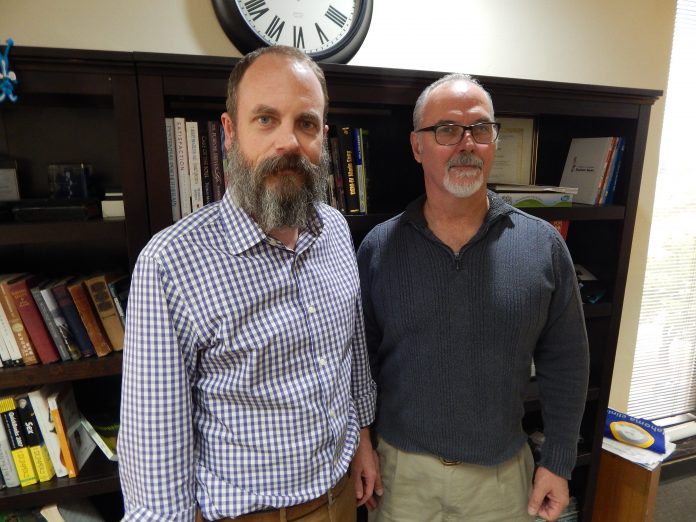
by James Coburn
Staff Writer
Clients are part of the decision making for their own treatment and Wellness at the Rivus Wellness and Research Institute in Oklahoma City, said Bruce Austin, RN, director of business development of the institute.
“Rivus is a word for ‘river,’” Austin said. “And what we want to promote here at Rivus is a sense of wellness with all of our clients, not just our therapy clients, but our research clients as well that deserve to feel good about coming to the doctor and coming to therapy and being part of a clinical trial.”
Rivus is not your typical generic approach for psychiatric care. Therapy by definition takes an hour, said Dr. Lane Peyton, psychiatrist and psychotherapist. Peyton serves as chief medical officer and is the principal investigator.
The therapist decides the frequency of care.
“It’s not the gravy train. We want our patients to get better and leave, but know that we’re still here when they might need us,” Peyton said.
Austin builds up business contacts and lets them know not only about research development, but also therapy, neurology and neurological diagnostics.
Rivus wants consumers to know they can feel good about visiting with a psychiatrist and psychotherapist while relaxing and asking questions. Psychotherapy is offered along with yoga and aroma therapy. Rivus has partnered with Hometown Neuro Diagnostics to promote in-home electroencephalograms. They are also going to recruit nutritionists as well as continue its clinical trials for direct research, Austin said.
Austin has been an RN for 34 years. He has spent the last 17 years as a psychiatric nurse. He said his previous role of being chief nursing officer at an Oklahoma City psychiatric hospital as well as his work in the Tulsa area has provided him many contacts.
He is familiar with tests used for clinical research and has participated in clinical research before himself. Austin conveys the language of the medical community well for communication purposes.
“Right now we have 18 to 20 research studies going on in trials,” he said. “And they vary. We stick more with the psychiatry/neurology type. In other words, we do a big opioid addiction study. We do depression. We may do schizophrenia type studies.”
“But we also have other things going on, too, with other partners.”
Rivus is partnering in osteoarthritis studies, pain studies and lipodemiology. Most of the studies are outpatient, but may in the future involve inpatient studies as well.
“The clinical trials potentially pay the participants,” he said.
Rivus takes a variety of insurance and is in the process of getting approved to take Medicare clients. Clients with Medicaid are already established.
“Many of our clients here not only see the psychiatrist or neurologist, but they may be involved in therapy with our therapist,” Austin said.
Rivus has developed a different medical model, Peyton said.
Insurance companies have a long history of association with integrated medical care. Rivus is taking the holistic approach beyond the traditional realm of care.
“We’re seeing this on the coast. We’re seeing this in medical research in the term wellness,” Peyton said.
Quality of life requires providers to communicate and step out of their silos and work with patients and the circle of care in order to benefit them.
“The (generic and traditional) sytem has enormous difficulty in communicating,” he said. “Even in the office, part of what we do everyday is not just discuss patients with permission, but what we’re working on in therapy — what we’re working on in terms of prescribing to accommodate that therapy — what we’re doing inside and out of the office in terms of primary medical needs.”
The Rivus model includes the choices its clients have for therapy as well as science and technology. Rivus has helped family doctors to chose the right type of anti-depressant by conducting a saliva test to look for enzymes that cause unique metabolic circumstances.
The pioneering beauty of Rivus is a blend of skill sets within one office that can produce better opportunities for clients.
“The insurance companies don’t want to pay the medical doctor to do any therapy — the one thing I believe the most in,” Peyton said.
So Peyton spent years helping patients adjusting to the rates accordingly, he said.
In 2012 all the evaluation and management codes of managed care systems were steered by commercial insurance companies to prescribe more, Peyton said.
Peyton does not accept this approach. And that is why he does not spend five minutes, but an hour with each client, he said.












